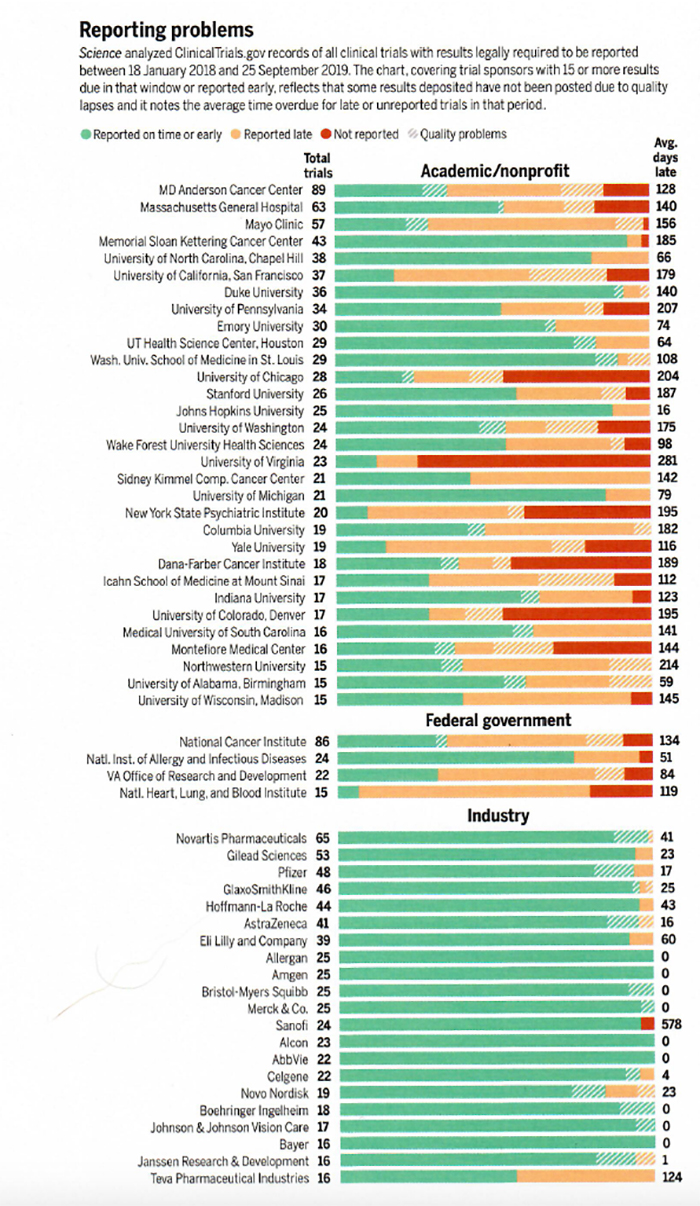A final “rule” regarding ClinicalTrials.gov was promulgated in 2017. It required registration of the study within 21 days of enrolling the first patient and posting a summary of results within 1 year of collecting the last patient’s data.
“…every clinical trial funded in whole or in part by NIH is expected to be registered on ClinicalTrials.gov and have summary results information submitted and posted in a timely manner…”

As the study reports, neither the FDA or NIH has bothered to enforce the regulation which includes daily fines of about $12,000 or suspension of grants. One picture captures all the words necessary to understand the problem
Green reflects timely filings – and look who is the most compliant, industry. Orange and red are late or no filings, and the winner in that category are academics and health centers. Nor was the NIH immune, they record too was disheartening.
Of course, there is always a reason why the labradoodle ate the homework. Some scientists argue that the results are published elsewhere, the regulators point out their limited resources and funding for enforcement; and that non-compliance may be mitigated by “nonpublic information” that they, and the investigators share. Does the phrase cronyism ring any bells?
The Science article gives an example of a study conducted by MD Anderson involving a specialized hormone therapy for men with surgically resected prostate cancer and a high risk of recurrence. Does it help or are the side effects too great? Since the study is 20 months late in reporting, no one knows. And the chief medical officer at MD Anderson, well he had no comment, after all, now he was the new FDA commissioner.
“Mayo, Yale, the University of Minnesota, Baylor, and Boston Children’s, which have similarly poor reporting records, all said via email that they, too, were committed to fulfilling ClinicalTrials.gov requirements.”
As the eminent scholar, Mary Poppins states, “That is a pie-crust promise, easily made and easily broken.”
The failure to meet regulatory deadlines is only a part of this problem. In some instances, the trial data reported is inaccurate, that perhaps as much as 16% of reported trials had basic flaws in reporting, they failed quality review. So not only do they hand in the homework late, in some instances, it is incoherent.
Now, all the news isn’t bad, 20 pharmaceutical companies got it right, and some major players including Sloan Kettering, Duke, and Johns Hopkins have made significant improvements. But overall, the culture that is science-government complex, doesn’t care. For all the concern expressed over transparency and reporting of results, the academics do not comply with the rules already in place. Do you think there would be greater outrage if the major offenders were pharmaceutical companies?
Here is a simple solution, if you don’t fulfill your requirements in a timely manner, you get a time out from further funding. Doesn’t the public, the real funder of these studies, deserve to see the results?
Source: Transparency on Trial Science Science Magazine DOI:10.1126/science.aba8123




